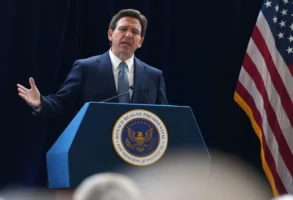
Published May 2, 2018
The most underappreciated political story of our time is the changing content of K-12 textbooks in history, civics, social studies, and related subjects. Yes, I said political story. Why are Millennials so receptive to socialism? Why are today’s Democrats dominated by identity politics? Why have movements on the political right shifted from a constitutional conservatism symbolized by the Boston Tea Party to a populist nationalism? All these changes, and more, are connected to what today’s history textbooks are, and are not, teaching. Yet we’ve barely noticed the link.
Almost any Advanced Placement (AP) U.S. history textbook has more influence on American politics than 90 percent of the books reviewed in our leading newspapers and political magazines. Yet when was the last time you read a review of a high school history textbook? Never, I’ll bet. That’s partly because these thousand-page monstrosities are tough to read, and even tougher to judge for anyone but professional historians. And with growing academic specialization, even historians find it difficult to assess an entire text.
Liberals needn’t bother keeping track of history textbooks because they’re the ones who write them. But conservatives have dropped the ball on this issue so essential to their survival. Conservative politicians, institutions, and donors focus far more on short-term electoral politics and policy than culture. History textbooks don’t even register. Over the long haul, that’s a recipe for political exile and social ostracism.
Conservatives saw the tip of the enormous textbook iceberg earlier this April when a radio host tweeted out pictures a Minnesota student had sent her of an AP U.S. history (APUSH) textbook. The student had photographed pages of the not yet formally released update of James W. Fraser’s By the People, an APUSH textbook published by the international education giant Pearson. Those pages covered the 2016 election and the Black Lives Matter movement. Their blatantly partisan bias set off a conservative media firestorm. (I commented here, and Joy Pullman’s important take is here.)
Essentially, Fraser’s updated text portrayed conservatives as bigots, Trump as mentally unstable, and the Black Lives Matter movement as a reasonable response to a police force acting like an “occupying army” in a “mostly African-American town.”
It was hit job as history.
Yet the full story of James W. Fraser’s By the People is more troubling than this. Fraser’s bias is no mere artifact of a bitterly polarizing election, but runs deeply through his text. The true tale of Fraser’s By the People makes you wonder how a textbook like this could have been published by a giant like Pearson, or effectively endorsed by the College Board, even pre-Trump. The answers are disturbing.
James W. Fraser is a professor of history and education at NYU’s prestigious Steinhardt School of Education. Prior to that, Fraser was the founding dean of Northeastern University’s School of Education. Fraser’s Ed School background is important. So let’s first have a look at his academic publications, which make the educational philosophy behind By the People frighteningly clear.
American Ed Schools are famously infatuated with Brazilian Marxist Paulo Freire’s 1970 book, Pedagogy of the Oppressed, and Fraser has been a leader in that movement. Fraser and a group of American educators worked closely with Freire in the mid-1990s to publish Mentoring the Mentor: A Critical Dialogue with Paulo Freire. Fraser’s contribution to that volume shows him to be a faithful acolyte of his mentor Freire. Both men seek a pedagogy capable of inspiring the overthrow of capitalist hegemony and its replacement by a classless society.
Like Freire, Fraser draws on the wisdom of Marxist heroes like Che Guevara. Yet as an historian of education, Fraser also invokes his extensive knowledge of textbooks. His most striking claim is that the textbooks used under Eastern European Communism were excellent in substance, even if their lessons were hammered home too harshly by teachers: “…in their critique of capitalism and imperialism, in their sophisticated approach to anti-Semitism, Fascism, and revolutionary struggle — [Eastern European communist textbooks] represented a very liberating view of the world…But sadly the pedagogy was as repressive as the content was liberating.”
This is a stunning claim. Fraser believes that if only Eastern Europeans had taught communism in a less authoritarian manner, a public freed from the Soviet yoke might not have rejected communism for capitalism. That is, Fraser sees the turn to capitalism by Eastern Europe as an avoidable “tragedy” caused by the unnecessarily harsh teaching methods of communist schools.
This is deluded. The content of Eastern European textbooks was every bit as authoritarian as communist pedagogy. Those textbooks, for example, included poems inspiring children to report even their best friends to the authorities for violations of party dictates. Those textbooks taught that no one is allowed to have “purely personal cares and difficulties in a socialist collective,” and denounced Germans who tried to escape over the Berlin Wall. East German textbooks instilled hatred for the “capitalist and imperialist” United States, which was painted in nightmare colors. Or is this the content Fraser considers “liberating”?
Fraser argues that “regimes of the right, including those in the United States and other so-called democracies” are every bit as authoritarian as communists, in their attempts to force capitalism on students. How curious, then, that Fraser and his Ed School comrades have so far escaped America’s Gulag.
Don’t mistake Fraser’s rejection of hard-nosed communist pedagogy for a commitment to political even-handedness. On the contrary, Fraser rejects “the pretense” of teacher neutrality as a pernicious cover for the interests of the powerful. The teacher, he says, “must begin with a commitment to social and political liberation.” Education, for Fraser, is a form of “revolutionary struggle.”
Fraser’s affinity for Marxism isn’t quite as obvious in his other work, but it isn’t particularly hidden either. Fraser’s academic writings of the 1990s regularly invoke leading socialist thinkers of the day, while attacking capitalism and private property. Fraser was positively hostile to the center-left presidency of Bill Clinton, and praised only the most leftward Democrats, like Maxine Waters and Barney Frank.
But Fraser reserves his most passionate antipathy for conservatives, whom he excoriates in his academic writings with unceasing fury. At one point Fraser approvingly quotes novelist E. L. Doctorow decrying the “poisonous” effects of Reagan conservatism, its “gangsterdom of the spirit” and affinity for fascism. According to Fraser, “If one characteristic marks the…years of the Reagan-Bush presidencies, it is the legitimization of greed.” Later Fraser adds, “Racism, like greed, has also been legitimated in the America of the 1980s and 1990s.” Fraser regularly condemns conservative intellectuals and rejects the “sheer mean-spiritedness of much of what passes for religion in this country.” During the George W. Bush administration, Fraser considered it the special responsibility of Ed School faculty to counter the president by advocating for an “internationalist and multicultural approach to foreign policy.”
Perhaps Fraser’s greatest wrath is reserved for what he calls “angry white maleness.” Like liberals of the day, Fraser saw the 1994 Republican takeover of the House as an expression of “angry white maleness,” which he called “a recipe for fascism.” But Fraser went further and dismissed even liberal Arthur Schlesinger’s well-received critique of multiculturalism, The Disuniting of America, as but a symptom of “angry white maleness.” Rather than address the arguments of conservatives and even moderate liberals, Fraser regularly dismisses them with attributions of anger and mean-spiritedness.
If Fraser scorns America as a “so-called democracy” and continually denounces conservatives, he has a soft-spot for radicals of every sort. His 2004 book, History of Hope, rummages through America’s past looking for models of hope amidst what Fraser sees as the general gloom of U. S. history. Fraser lauds the 19th century utopian movements that dispensed with monogamy and private property. He celebrates ethnic Mexicans in the American Southwest who refused to accept the results of the Mexican-American war even generations later, praising their violent resistance to “Anglo-American aggression.” Fraser even applauds traditional Mexico’s communal conception of property as a hopeful alternative to America’s acceptance of capitalism. Naturally, Fraser hails America’s first great socialist leader, Eugene V. Debs. He commends the various liberation movements of the 1960s, lauds Jesse Jackson’s Rainbow Coalition, and even praises the anarchists whose violent demonstrations in Seattle in 1999 shut down a meeting of the World Trade Organization. Those violent demonstrators, forerunners of Occupy Wall Street, were fiercely condemned by mainstream liberals at the time.
So does Fraser’s AP U.S. history textbook, By the People, reflect the egregious political biases of his popular and academic work? Not according to his publisher, Pearson, which said when challenged on the anti-Trump additions: “[This textbook] was developed by an expert author and underwent rigorous peer review to ensure academic integrity…[it] aims to promote debate and critical thinking by presenting multiple sides.” The claim that a thoroughly politicized and almost uniformly leftist history profession would nix this textbook via peer review is laughable. When it comes to political bias, today’s academics are peers, all right.
By the People does provide a fig leaf for the “multiple sides” claim by presenting occasional “boxes” juxtaposing original texts from opposing sides of the political spectrum. We know from History of Hope that Fraser sees Jesse Jackson’s “Rainbow Coalition” speech at the 1988 Democratic National Convention as a high point of American history. In By the People, though, excerpts from Jackson’s address are juxtaposed to passages from Pat Robertson’s speech at the 1988 Republican Convention.
The problem is that the main text of By the People lays the groundwork for Jackson by presenting every leftist movement of the time in glowing, uncritical terms. Conservatives, on the other hand, are consistently portrayed as angry, unthinking reactionaries and vicious racists.
In the main text, for example, Fraser quotes gauzy, moderate-sounding rhetoric from the charter of the radical Students for a Democratic Society (SDS), and lengthy inspiring excerpts from President Obama’s second inaugural address. When leftists go to extremes, Fraser always offers justifications: American napalm in Vietnam explains violent anti-war demonstrations; Black Panther radicalism is merely a response to police forces acting like “occupying armies” in the black community (identical to Fraser’s controversial framing of the Black Lives Matter movement). Fraser goes into high dudgeon over Rush Limbaugh’s humorous jabs at the left, bemoaning the decline of “good manners.” Yet he presents the vastly cruder antics of the Yippies as necessary mockery of those who were “leading the country to ruin.”
Conservatives, by contrast, lacking apparent justification for their actions, simply react in anger and fear. Fraser rarely provides reasons for conservatives’ views, and they’re mangled when he des. Opposition to Clintoncare and Obamacare is said to be fueled by selfish insurance interests, not policy arguments. While leftists are presented via their own most inspiring rhetoric, conservatives’ actions are framed by quotes from their critics.
Fraser highlights religious arguments, like the preacher who said, “The blessings of capitalism come from God.” Yet the modern conservative movement and its leading ideas remain a mystery to Fraser’s readers. After reams of gauzy leftist rhetoric, the sum total of Fraser’s account of Buckleyite conservatism is that “any interference with individual rights would destroy human freedom.” Instead of presenting the argument for limited government, we’re told that conservatives opposed Obamacare because of a “longstanding bias among Americans against big government.” All of this is consistent with Fraser’s academic work, which reduces conservatism to a series of irritable mental gestures.
Again and again, Fraser portrays conservatives as heartless racists and sexists. He mischaracterizesthe GOP’s “southern strategy,” and explains opposition to Hillary Clinton as the product of sexism. Concerns about crime are dismissed as code for racial bigotry. Controversies over single motherhood and conservative stances on social issues are treated as simple heartlessness or antiquated religiosity, rather than concern over family decline. On abortion, opponents are not in favor of the right to life but said to be “opposed to abortion rights.” For Fraser, there’s no such thing as illegal immigrants, only those who came to the United States “without official approval.”
So the anti-conservative bias of the recent updates to By the People is matched by the prejudice of the larger text. It’s impossible to see how a student using Fraser’s textbook could even respect conservatives, much less become one.
All this was to be expected, given the 2014-2015 battle over the College Board’s revised AP U.S. history curriculum. I argued then that the new APUSH framework was biased for portraying liberals responding to genuine problems but conservatives reacting from fear. Obviously, Fraser’s political biases match perfectly with the College Board’s.
How could a man who at least appears to be a committed socialist, who dismisses America as a fake democracy, and who despises conservatives, have been chosen by a leading publisher like Pearson to write an American history textbook meant to be used by students of every political view? It’s clear from the left-multiculturalist bias of the College Board’s APUSH framework that Fraser was a logical choice to write an accompanying textbook. The College Board’s new curriculum was bound to produce this sort of text.
By the People also shows us that the College Board’s controversial decision to cover “history” right up to the present is a recipe for political abuse, just as critics claimed. Students should not be forced to digest Fraser’s (or anyone else’s) viciously partisan take on the politics of the day as “history.”
Critics also warned that the College Board’s decision to issue detailed curricula for its AP courses was a strategy for circumventing state and local authorities to create a de facto leftist national curriculum. Fraser himself buys into that view. He teaches a course at NYU that uses By the Peopleand the College Board’s new AP U.S. History framework to train, not only future AP teachers, but teachers of social studies and regular U.S. history. His syllabus for that course argues that we should treat the College Board’s new APUSH framework as de facto national standards for all U.S. history courses, AP or not. Sadly, he’s got a point.
Still more sadly, James W. Fraser’s story is America’s story. I know no more powerful example of the radical left’s long march through the institutions. A Marx-loving disciple of Paulo Freire is now churning out textbooks, teachers, and students who neither understand nor respect America’s founding ideas, nor those who continue to defend them.
Conservatives have been caught short, not so much by pious denials of bias on the part of institutions like Pearson or the College Board, but by their own obsession with short-term politics. Meanwhile, we’re getting killed in the culture, which just may be the most underexplored political story of our day.
As I’ve argued for several years, it’s time to bring competition to the world of college-placement testing. Only a testing company able to compete with the College Board’s AP program can restore choice, balance, and local control to America’s education system.
— Stanley Kurtz is a senior fellow at the Ethics and Public Policy Center.








